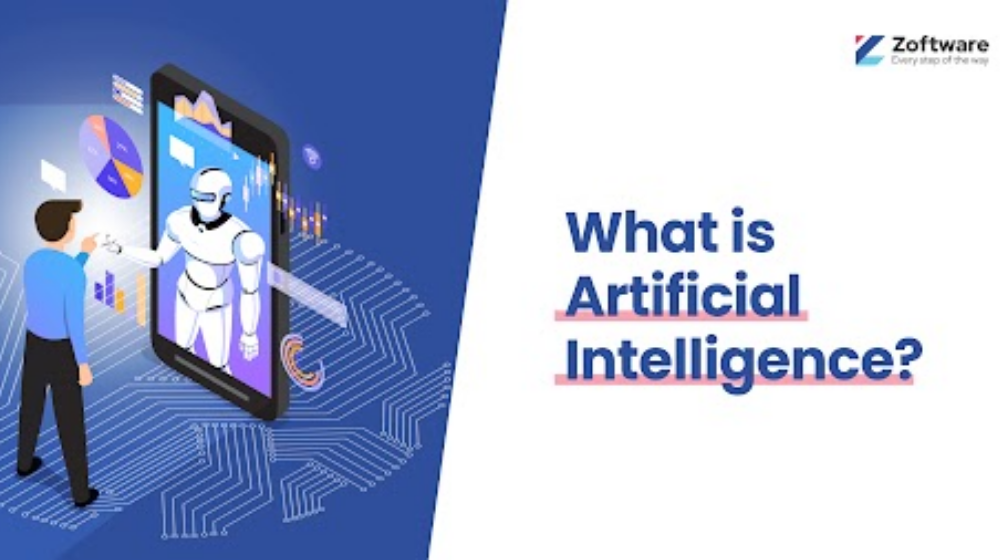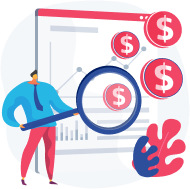In 2022, the market size for artificial Intelligence in India was valued at $680 million. Projections indicate that in 2028, this figure is anticipated to climb to $3,935.5 million. This growth represents a Compound Annual Growth Rate (CAGR) of 33.28% from 2023 to 2028.
Oh, the prediction is quite unbelievable, right? But why not?
Artificial Intelligence allows technology to invent new stuff and grow; in simple terms, it will enable it to evolve and transform with time. Every time you learn about artificial Intelligence, you will discover something new.
This blog will explain the depths of artificial Intelligence.
What is Artificial Intelligence?
Do you need to know what Artificial Intelligence is? Well, many of you know what AI is. But how many of you know what artificial Intelligence is all about? Let’s understand AI in detail.
Key Artificial Intelligence Concepts
There are three basic concepts of AI to study first. Here are they given below:
- AI Algorithms – Algorithms are the basics of AI technologies. They are the mathematical and computational instructions machines use to perform problem-solving, decision-making, and learning from data. These algorithms can help with simple tasks such as decision-making trees and advanced neural networks.
- Data – Artificial Intelligence feeds on data to perform any task. Though it mimics human Intelligence without providing data, it cannot generate and work on ideas. It is the most significant limitation of Artificial Intelligence. Data provides the required information for Artificial Intelligence to process and deliver outcome-based information.
- Learning methods – AI learning methods are diverse, each with unique approaches to processing information. They allow artificial Intelligence to acquire knowledge and improve performance over time.
Differentiate AI from machine learning and automation.
Understanding Artificial Intelligence
Artificial Intelligence is a broad term in computer science. It is dedicated to creating systems with the potential to perform activities that require human Intelligence. Artificial Intelligence includes different categories of tasks such as speech recognition, decision-making, language translations, and object identifications.
Artificial intelligence systems are designed to process vast amounts of data, learn from it, and make informed decisions or predictions. Artificial Intelligence is frequently used to explain machines or computers that perform cognitive functions like problem-solving and learning.
Distinguishing Machine learning
Though machine learning is an integral component of Artificial Intelligence, it differs slightly from what Artificial Intelligence does. Machine learning involves developing computer algorithms, enabling it to learn, predict, or decide based on data. In machine learning, you do not need explicit programming for every task, as traditional AI requires.
AI is more rule-based, and machine learning can improve its performance with time as more data is fed to the systems. Continuous learning is critical to Machine learning, allowing systems to adapt and make accurate predictions.
Automation: Another Different Concept
The most confusing term associated with artificial Intelligence is automation. Just because workflow automation performs without human interaction, it is not the same as artificial Intelligence mimicking human Intelligence. Though both are rule-based, workflow automation doesn’t require machine learning to learn or adapt.
Automation refers to using technology to perform tasks. Most businesses use workflow automation to streamline their operations and increase productivity. Also, marketing automation has gained popularity with time. There are many marketing automation tools and websites to improve marketing practices.
Artificial Intelligence is used to act like human Intelligence and perform tasks performed by humans more effectively and efficiently. Automation allows a task to repeat itself without human interference. It doesn’t use any Intelligence or apply learnings to any task. Humans or AI would have instructed them before performing tasks when required.
Real-world applications of Artificial Intelligence
By studying real-world applications, let’s understand how artificial Intelligence works in action. We must explore AI in different industries, how it helps our day-to-day activities, and some concerns and myths.
Diverse applications of AI across industries
- Healthcare: The integration of Artificial Intelligence in the healthcare sector has revolutionized diagnostic processes. It enhances the speed and precision of analyzing medical images, leading to early detection of illnesses and the development of tailored treatment strategies, ultimately improving patient care outcomes.
- Finance: Artificial Intelligence has significantly transformed the financial industry by streamlining the assessment of risks, implementing automated trading systems, and bolstering fraud detection capabilities. These improvements offer consumers more robust and efficient financial services.
- Education: AI redefines educational methods by providing customized learning experiences that adapt to each student’s unique requirements and learning rates. This adaptation results in increased engagement and better academic results.
- Science: In scientific research, artificial Intelligence is a game-changer. It analyzes intricate data sets, facilitating significant advancements in genomic studies and climate change modeling. This leads to groundbreaking solutions across various scientific domains.
- Economy: AI-driven analytics in the economy are pivotal in optimizing supply chain operations, projecting market trends, and supporting informed policymaking. This contributes significantly to the pursuit of sustained economic development.
AI’s role in solving everyday problems
- Artificial Intelligence revolutionizes customer support by implementing customer service chatbots that deliver instant, customized answers, reduce wait times, automate email marketing, and enhance the overall customer experience.
- In healthcare, AI assists in the early recognition and diagnosis of diseases, employing advanced data analysis to spot patterns that might go unnoticed by human practitioners, leading to improved patient care results.
- Security enhancements are a notable benefit of AI, which analyzes large datasets to quickly detect irregularities and potential security risks, thus strengthening individual and data protection.
- Traffic flow is improved through artificial Intelligence, which uses real-time data analysis to ease congestion and shorten travel times.
- Educational methods are transformed by AI, which tailors learning to individual student needs, enabling personalized educational journeys and better accommodating diverse learning preferences.
- AI’s role in environmental monitoring involves more accurate predictions of weather conditions and natural events, ensuring timely alerts and efficient response strategies.
- In the financial sector, AI provides sophisticated fraud detection by examining transaction patterns for signs of unusual activity, thereby safeguarding consumer financial assets.
- Artificial Intelligence is critical for businesses to optimize inventory management, accurately predict demand, and reduce waste through more competent resource management.
Discuss AI’s Impact on society, jobs, and ethics.
- Transforming Job Market: Artificial Intelligence is revolutionizing the job market by automating routine tasks, shifting demand toward skilled professions, and creating new roles centered around AI management and ethics.
- Ethical Considerations: The rise of AI necessitates re-evaluating ethical standards, focusing on data privacy, algorithmic bias, and the moral implications of autonomous systems.
- Impact on Society: AI is poised to enhance societal efficiency in sectors like healthcare and transportation, but it also raises concerns about privacy and the digital divide.
- Revolution in Healthcare: By leveraging artificial Intelligence, healthcare can achieve unprecedented diagnostic accuracy, personalized treatment plans, and improved patient outcomes, but must balance these with data security.
- Influence on Education: AI promises to personalize and revolutionize education by adapting to individual learning styles, yet it challenges traditional teaching methods and raises questions about equal access.
- Economic Impacts: Artificial Intelligence can drive economic growth by optimizing production, enhancing research, and creating new markets, but it also risks widening the gap between high and low-skilled workers.
- Change in Consumer Behavior: AI’s advanced predictive algorithms can tailor experiences to individual preferences, transforming consumer behavior and raising issues regarding manipulation and privacy with the help of customer service bots. With the help of marketing automation, AI has influenced marketing strategies and contributed to consumer behavior prediction.
Common concerns and myths about AI
- Myth: AI can surpass human Intelligence imminently. Reality: While artificial Intelligence advances, it remains far from replicating human cognitive abilities. AI excels in specific, programmed tasks but needs more general understanding and adaptability.
- Concern: AI will lead to massive job losses. While AI changes job landscapes, it also creates new roles and industries. The emphasis should be on adapting skills and embracing AI as a tool for job enhancement rather than replacement.
- Myth: AI operates independently without bias. AI systems are only as unbiased as the data they are trained on. Inherent biases in data can lead to skewed AI decisions, necessitating careful data management and ethical AI practices.
- Concern: AI threatens personal privacy. The use of artificial Intelligence in data analysis can raise privacy concerns. Implementing robust privacy safeguards and transparent data practices to protect individual rights is crucial.
- Myth: AI is infallible and consistently accurate. Like any technology, artificial Intelligence has limitations and can make errors, especially in complex or novel situations. It’s essential to evaluate and refine AI systems regularly.
- Concern: AI will lead to a loss of human touch in services. Artificial Intelligence enhances efficiency but cannot replace the nuanced understanding and empathy of human interaction. Its role should be to support, not substitute, human services.
Frequently Asked Questions
- What is Artificial Intelligence, in simple words?
- Artificial Intelligence is the creation of intelligent machines that mimic human thinking and decision-making.
- What is AI with an example?
- AI example: Siri uses AI to understand and respond to voice commands.
- What is AI to explain?
- AI involves machine learning, problem-solving, and performing tasks like humans.
- What are artificial Intelligence’s short answers?
- Artificial Intelligence is a technology that enables machines to imitate human Intelligence.
Conclusion
Though Artificial Intelligence is revolutionizing your lives, locating the ideal AI software and systems for your business can sometimes be challenging. But worry not. There is always a solution to your problem – Zoftware.
Situated in the Middle East, Zoftware is a platform dedicated to discovering software, primarily focusing on helping companies select the right AI software and tools. Zoftware assists businesses in understanding their needs and comparing various AI software options, enabling a more informed and accurate decision-making process.
Sign up now at Zoftware to discover your business’s perfect AI software solution.

